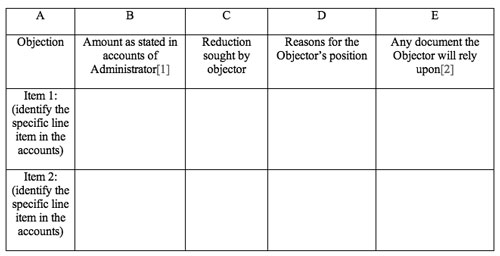| Owner's request for an administrator denied, but he got partial costs |
| Questioning an administrator's accounts |

| a) |
adoption of the Reserve Fund recommendations to set aside $71,000 for that fiscal year with rate of inflation increases; |
| b) |
repairing the roof. |
| c) |
replacement of the property management company in the fall of 2013; |
| d) |
retaining Ontario Parking Authority to tag illegally parked vehicles in the lot and a security company being retained to conduct weekly visits. |
| a) |
whether there has been established a demonstrated inability to manage the corporation; This application would have had greater success had it been returnable in or about August, 2013, that is, before the more recent activity by the respondent Board of Directors to take the steps listed above. Were this the only factor to consider, the judge would not have granted grant the relief sought. |
| b) |
whether there has been demonstrated substantial misconduct or
mismanagement or both in relation to the affairs of the corporation; The applicant's actions, prior to this Application prodded the Board of Directors to begin taking the steps that they needed to take and the more recent attention and activity to the affairs of the Board should not be in their favour. The judge agreed with this position. Were this the only factor to consider, the judge would have been inclined to grant the relief sought. |
| c) |
whether the appointment of an administrator is necessary to bring order to the affairs of the corporation; The applicant’s position was weakened by not having identified the individual or entity to be the administrator along with their qualifications to do so. Mr. Torok attempted to correct this deficiency by providing a Supplementary Affidavit on November 24 that contained the resumes of two qualified individuals who were willing to be administrators. It is important to note the current Board of Directors is active and that the financial affairs of the respondent is not one of any significant debt. Further, they have adopted the recommendation of the most recent reserve fund study. Were this the sole factor considered, the judge would not grant the application. |
| d) |
whether there is a struggle within the corporation among competing
groups such as to impede or prevent proper governance of the
corporation; The judge interpreted this to be more at the Board of Directors level such that the ability of the Board to make decisions and take necessary steps is being frustrated. That was not the case in this situation before him. Here the Board of Directors has been capable of making decisions and is proceeding with the business of the corporation. The applicant may not be satisfied with or in favour of those decisions (or the speed with which they are being made) but the situation has not reached a point where, in the judge's view, the activity of the Board has stopped or the market value of each unit holder’s investment, including that of the applicant, has been seriously compromised or is about to be seriously compromised. Were this the sole factor, the judge would not grant the application. |
| e) |
where only the appointment of an administrator has any reasonable prospect of bringing to order the affairs of the corporation. While the judge concluded that the actions of this Board of Directors has been substandard in the past, he would also note the evidence that they were elected by the unit owners in November, 2013 for a three year term and he was provided a copy of the Notice of Annual General Meeting to proceed on December 6, 2016. Were this the only factor to consider, he would not have granted the relief sought. |
| 1. |
The owner failed to get an administrator but he was awarded token costs equalling 7% of his total legal costs. |
| 2. |
The owner was given leave to return to the courts to apply for an administrator if the board backslides in it's duties to maintain the property. |
| 3. |
The judge took into consideration the market value of each unit holder’s investment and whether that had deteriorated. |
| 4. |
The judge concluded that the actions of Board had been substandard in the past. (I know of dozens of boards who do no better and many far worse.) |
| 5. |
Mr. Torok's legal costs were twice as high as the corporation's. |
| 6. |
Each owner, including Mr. Torok, will need to pay an average of $550 per unit for the corporation's legal costs. |
